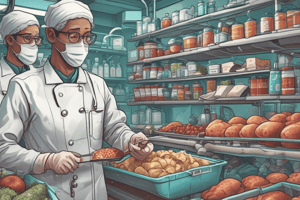Podcast
Questions and Answers
Which foodborne pathogen is found in improperly canned or fermented foods?
Which foodborne pathogen is found in improperly canned or fermented foods?
- Escherichia coli (E.coli)
- Salmonella
- Listeria
- Clostridium botulinum (correct)
Norovirus is a foodborne pathogen found in contaminated food and water.
Norovirus is a foodborne pathogen found in contaminated food and water.
True (A)
What type of food poisoning does Listeria cause?
What type of food poisoning does Listeria cause?
listeriosis
_____ is a foodborne pathogen found in undercooked meat, raw milk, and contaminated water, causing urinary tract infections and food poisoning.
_____ is a foodborne pathogen found in undercooked meat, raw milk, and contaminated water, causing urinary tract infections and food poisoning.
Match the following sources of foodborne pathogens with their examples:
Match the following sources of foodborne pathogens with their examples:
Flashcards are hidden until you start studying
Study Notes
Foodborne Pathogens
Definition
Foodborne pathogens are microorganisms that can cause illness in humans through the consumption of contaminated food.
Types of Foodborne Pathogens
Bacteria
- Salmonella: Found in poultry, eggs, and raw meat; causes salmonellosis, a type of food poisoning
- Escherichia coli (E. coli): Found in undercooked meat, raw milk, and contaminated water; causes urinary tract infections and food poisoning
- Campylobacter: Found in poultry, raw milk, and contaminated water; causes campylobacteriosis, a type of food poisoning
- Listeria: Found in soft cheeses, hot dogs, and deli meats; causes listeriosis, a type of food poisoning
- Clostridium botulinum: Found in improperly canned or fermented foods; causes botulism, a type of food poisoning
Viruses
- Norovirus: Found in contaminated food and water; causes norovirus infection, a type of food poisoning
- Hepatitis A: Found in contaminated food and water; causes hepatitis A, a type of liver infection
Parasites
- Giardia: Found in contaminated water and raw meat; causes giardiasis, a type of intestinal infection
- Cryptosporidium: Found in contaminated water and raw meat; causes cryptosporidiosis, a type of intestinal infection
Sources of Foodborne Pathogens
- Animal sources: Undercooked meat, poultry, eggs, and dairy products
- Environmental sources: Contaminated water, soil, and air
- Human sources: Poor hygiene, handling, and preparation of food
- Food processing and handling: Improper storage, handling, and preparation of food
Factors Contributing to Foodborne Illness
- Temperature abuse: Inadequate refrigeration, storage, and cooking of food
- Cross-contamination: Transfer of pathogens from one food or surface to another
- Poor personal hygiene: Failure to wash hands, utensils, and equipment
- Inadequate cooking: Undercooking or raw consumption of food
Prevention and Control Measures
- Proper food handling and storage: Refrigeration, freezing, and proper storage of food
- Cooking and reheating: Adequate cooking and reheating of food to kill pathogens
- Personal hygiene: Washing hands, utensils, and equipment regularly
- Food safety regulations: Adherence to regulations and guidelines for food handling and preparation
Foodborne Pathogens
Definition
- Foodborne pathogens are microorganisms that can cause illness in humans through consuming contaminated food.
Types of Foodborne Pathogens
Bacteria
- Salmonella: Found in poultry, eggs, and raw meat, causing salmonellosis.
- Escherichia coli (E.coli): Found in undercooked meat, raw milk, and contaminated water, causing urinary tract infections and food poisoning.
- Campylobacter: Found in poultry, raw milk, and contaminated water, causing campylobacteriosis.
- Listeria: Found in soft cheeses, hot dogs, and deli meats, causing listeriosis.
- Clostridium botulinum: Found in improperly canned or fermented foods, causing botulism.
Viruses
- Norovirus: Found in contaminated food and water, causing norovirus infection.
- Hepatitis A: Found in contaminated food and water, causing hepatitis A.
Parasites
- Giardia: Found in contaminated water and raw meat, causing giardiasis.
- Cryptosporidium: Found in contaminated water and raw meat, causing cryptosporidiosis.
Sources of Foodborne Pathogens
- Animal sources: Undercooked meat, poultry, eggs, and dairy products.
- Environmental sources: Contaminated water, soil, and air.
- Human sources: Poor hygiene, handling, and preparation of food.
- Food processing and handling: Improper storage, handling, and preparation of food.
Factors Contributing to Foodborne Illness
- Temperature abuse: Inadequate refrigeration, storage, and cooking of food.
- Cross-contamination: Transfer of pathogens from one food or surface to another.
- Poor personal hygiene: Failure to wash hands, utensils, and equipment.
- Inadequate cooking: Undercooking or raw consumption of food.
Prevention and Control Measures
- Proper food handling and storage: Refrigeration, freezing, and proper storage of food.
- Cooking and reheating: Adequate cooking and reheating of food to kill pathogens.
- Personal hygiene: Washing hands, utensils, and equipment regularly.
- Food safety regulations: Adherence to regulations and guidelines for food handling and preparation.
Studying That Suits You
Use AI to generate personalized quizzes and flashcards to suit your learning preferences.




